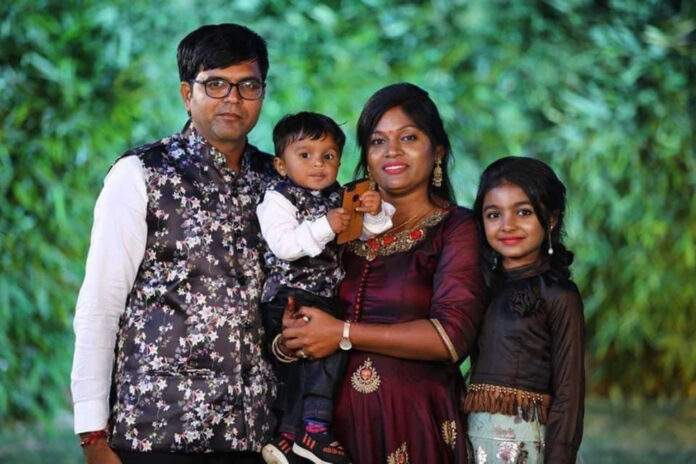MEMBERS of the family of four Indian nationals who froze to death approximately 12 metres from the US/Canada border near Emerson, Manitoba, trying to cross the border illegally into the US on January 19 have now been identified by the Manitoba RCMP as Jagdishkumar Patel, a 39-year-old male; Vaishaliben Patel, a 37-year-old female; Vihangi Patel, an 11-year-old female; and Dharmik Patel, a three-year-old male.
The autopsies were completed on January 26 and the identities of the victims were confirmed.
Police said that they immediately launched an extensive investigation with the Manitoba RCMP, including officers from Emerson RCMP Detachment, the Integrated Border Enforcement Team (IBET) and Major Crime Services, working in close collaboration with U.S. Customs and Border Protection and the U.S. Department of Homeland Security.
The Office of the Chief Medical Examiner of Manitoba has confirmed that the cause of death was due to exposure.
Chief Superintendent Rob Hill, Officer in Charge of Criminal Operations for the Manitoba RCMP, said in a statement: “Initially, we had identified one of the victims as a male teen. We apologize for that error but please understand that the frozen state in which the bodies were found and the clothing worn by the family made the initial identification difficult.
“It is also why the process to confirm the names took an extended period of time.”

He added: “The RCMP has started an extensive investigation as to how the Patel family made their way to Canada and, ultimately, to Emerson. This investigation is complex as it involves work at the provincial, national and international level. As Canada’s national police force, we are well positioned to address these complexities.
“We have officers from detachments near the border, as well as Major Crimes Services and a number of Federal Policing officers all working together to gather information and advance the investigation.
“We are also working closely with RCMP Liaison Officers who are stationed in New Delhi, India, and Washington, D.C. and we are in regular contact with the U.S. Customs and Border Protection and Homeland Security Investigations.
“Further, we are speaking regularly with Indian consular officials who arrived in Winnipeg on Saturday. I want to extend my thanks to them for assisting us with the next of kin notifications earlier this morning.
“What we can release at this time is that the Patel family arrived in Toronto on January 12, 2022. This was their first point of entry into Canada.
“From Toronto, the family made their way to Manitoba and eventually to Emerson on, or about, January 18.
“There was no abandoned vehicle located on the Canadian side of the border – this clearly indicates that someone drove the family to the border and then left the scene.
“With what we know so far of their activities in Canada, along with the arrest that occurred in the United States, we believe this to be a case of human smuggling.
“Our officers with Major Crime Services and Federal Policing are looking at every aspect of their journey. This includes their travel from Toronto on January 12 to Emerson around January 18.
“This is an extended period of time for a family who is unfamiliar with Canada to be travelling across the country. A part of the investigation is determining whether this travel was facilitated in some way by an individual or individuals.
“It is our belief that people had interactions with the Patel family during their stay in Canada. This can include hotel, gas station or restaurant employees.
“We need anyone who had interactions with the Patel family or has information about their journey to the border to think about what they went through and to step forward. We need you to contact our Major Crime Services Tip Line at: 431-489-8551.
“Any information about their time in Canada will be incredibly helpful to our investigators.
“This will be a lengthy international investigation. We are looking at months and months of work ahead of us but our officers are determined to find out exactly how this tragedy occurred.”
If you have any information on this investigation, call the Manitoba RCMP Major Crime Services at 431-489-8551, or call Crime Stoppers anonymously at 1-800-222-8477, or secure tip online at www.manitobacrimestoppers.com.
LAST Sunday (January 23), The VOICE reported on our website voiceonline.com, that the Indian Express newspaper of India reported that Dingucha village of the local administrative division of Kalol in Gandhinagar district had become the centre of attraction with police visiting a man whose family had recently travelled to Canada and who are now missing.
Police and relatives say the descriptions of the missing members of the family matched those of the four individuals whose bodies were found in Canada.
The Indian Express reported that people who knew the family said they had left for Canada on visitor visas on their first visit abroad. The missing members had not been in touch with their relatives since Wednesday — the same day that the four bodies were found in Canada.

Photo: U.S. Immigration and Customs Enforcement
As The VOICE had reported last week on our website on Thursday (January 20), Steve Shand, 47, of Florida, a U.S. citizen, was arrested and charged with human smuggling on January 19 by U.S. authorities. The U.S. Border Patrol (USBP) initiated a traffic stop on a white-colored, 15-passenger van driven by Shand less than one mile south of the U.S./Canadian border in a rural area between the official ports of entry located at Lancaster, Minnesota, and Pembina, North Dakota. Law enforcement asked for identification of the two passengers in the van and determined them to be undocumented Indian nationals.
While Shand and the two passengers were being transported to the Pembina Border Patrol Station in North Dakota, law enforcement encountered five additional Indian nationals approximately a quarter mile south of the Canadian border walking in the direction of where Shand was arrested. The five Indian nationals explained that they had walked across the border expecting to be picked up by someone. One of the group members was in possession of a backpack that did not belong to him. He stated he was carrying the backpack for a family of four Indian nationals that had earlier walked with his group but had become separated during the night. The backpack contained children’s clothes, a diaper, toys, and some children’s medication.
Later during the day on January 19, the USBP received a report from the RCMP that four bodies were found frozen just inside the Canadian side of the international border. The dead bodies were tentatively identified as the family of four that was separated. Two of the surviving Indian nationals sustained serious injuries and were transported to a hospital.
A Gandhinagar senior administrative officer told The Indian Express, “We have not received any official communication from the Ministry of External Affairs (MEA) regarding the identity of the deceased people yet. The villagers have been informed of the same.”
A police inspector told the newspaper: “A team did visit the village on Saturday and we have found that there is a family of five there, four of whom had gone to Canada leaving behind the sexagenarian grandfather. We have found out that he has now moved to Ahmedabad to stay with his younger brother.”
Amritbhai Vakil (69), a relative of the missing family, told the Indian Express: “I visited their house on Friday and congratulated the man’s father saying that his son and daughter-in-law were about to build new lives, and there was nothing to worry. He told me that he was unable to contact them. On Saturday, I heard about the dead Indian family on TV.”
WHY GUJARATIS WOULD PREFER U.S.
Is Canada being used by Gujaratis (people from the Indian state of Gujarat) as a convenient way to illegally enter the U.S. by first coming here on tourist visas?
It is well-known that the Gujaratis in the U.S. are a highly successful business community. For example, Wikipedia states: “Given the Gujarati propensity for business enterprise, a number of them opened shops and motels [in the U.S.]. While they may make up only around 0.1% of the population in the United States, Gujarati Americans control over 40% of the hospitality market in the country, for a combined net worth of over US$40 billion and employing over one million employees. Gujaratis, especially the Patidar samaj, also dominate as franchisees of fast food restaurant chains such as Subway and Dunkin’ Donuts.”
With so many well-established business families from Gujarat in the U.S., their relatives and friends naturally see the U.S. as the most advantageous place for them.
Wikipedia also states: “The United States has the second-largest Gujarati diaspora after Pakistan. The highest concentration of the population of over 100,000 is in the New York City Metropolitan Area alone, notably in the growing Gujarati diasporic center of India Square in Jersey City, New Jersey, and Edison in Middlesex County in Central New Jersey.”













